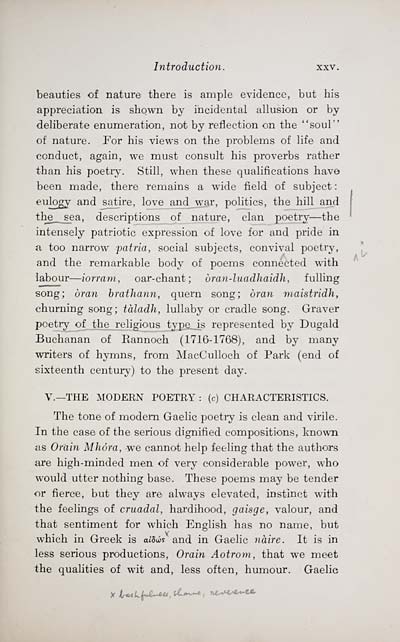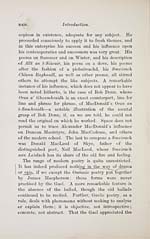Download files
Complete book:
Individual page:
Thumbnail gallery: Grid view | List view

lìitroduction. xxv.
beauties of nature there is ample evidence, but his
appreciation is shown by ihcidental allusion or by
deliberate enumeration, not by reflection on the "soul"
of nature. For his views on the problems of life and
conduct, again, we must consult his proverbs rather
than his poetry. Still, when these qualifications have
been made, there remains a wide field of subject :
eu logy and ^atire, love and war, politics, the hill and
tb_e_ sea, descriptions of nature, clan poetry — the
intensely patrio'tic expx-ession of love for and pride in
a too narrow patria, social subjects, convival poetry,
and the remarkable body of poems connècted with
ìabour — iorram, oar-chant ; òran-luadhaidh, fuUing
song; òraìi brathann, quern song; òraìi maistridh,
churning song; tàladh, lullaby or cradle song. Graver
pcetry of the rehgious type.,is represented by Dugald
Buchanan of Eannoch (1716-1768), and by many
writers of hymns, from IMacCulloch of Park (end of
sixteenth century) to the present day.
V.— THE ]\IODERN POETRY : (c) CHARACTERISTICS.
The tone of modem GaeHc poetry is clean and virile.
In the case of the serious dignified compositions, known
as Orain Mhòra, we cannot help feeling that the authors
are high-minded men of very considerable power, who
would utter nothing base. These poems may be tender
or fierce, but they are always elevated, instinct with
the feelings of cruadal, hardihood, gaisge, valour, and
that sentiment for which English has no name, but
which in Greek is ai5t6r and in Gaehc nàire. It is in
less serious productions, Orain Aotrom, that we meet
the quahties of wit and, less often, humour. Gaelic
beauties of nature there is ample evidence, but his
appreciation is shown by ihcidental allusion or by
deliberate enumeration, not by reflection on the "soul"
of nature. For his views on the problems of life and
conduct, again, we must consult his proverbs rather
than his poetry. Still, when these qualifications have
been made, there remains a wide field of subject :
eu logy and ^atire, love and war, politics, the hill and
tb_e_ sea, descriptions of nature, clan poetry — the
intensely patrio'tic expx-ession of love for and pride in
a too narrow patria, social subjects, convival poetry,
and the remarkable body of poems connècted with
ìabour — iorram, oar-chant ; òran-luadhaidh, fuUing
song; òraìi brathann, quern song; òraìi maistridh,
churning song; tàladh, lullaby or cradle song. Graver
pcetry of the rehgious type.,is represented by Dugald
Buchanan of Eannoch (1716-1768), and by many
writers of hymns, from IMacCulloch of Park (end of
sixteenth century) to the present day.
V.— THE ]\IODERN POETRY : (c) CHARACTERISTICS.
The tone of modem GaeHc poetry is clean and virile.
In the case of the serious dignified compositions, known
as Orain Mhòra, we cannot help feeling that the authors
are high-minded men of very considerable power, who
would utter nothing base. These poems may be tender
or fierce, but they are always elevated, instinct with
the feelings of cruadal, hardihood, gaisge, valour, and
that sentiment for which English has no name, but
which in Greek is ai5t6r and in Gaehc nàire. It is in
less serious productions, Orain Aotrom, that we meet
the quahties of wit and, less often, humour. Gaelic
Set display mode to: Large image | Transcription
Images and transcriptions on this page, including medium image downloads, may be used under the Creative Commons Attribution 4.0 International Licence unless otherwise stated. ![]()
| Early Gaelic Book Collections > Matheson Collection > Bardachd Ghaidhlig > (29) |
|---|
| Permanent URL | https://digital.nls.uk/76422880 |
|---|
| Description | Specimens of Gaelic poetry 1550-1900. |
|---|---|
| Shelfmark | Mat.50 |
| Additional NLS resources: | |
| Attribution and copyright: |
|
| Description | Items from a collection of 170 volumes relating to Gaelic matters. Mainly philological works in the Celtic and some non-Celtic languages. Some books extensively annotated by Angus Matheson, the first Professor of Celtic at Glasgow University. |
|---|
| Description | Selected items from five 'Special and Named Printed Collections'. Includes books in Gaelic and other Celtic languages, works about the Gaels, their languages, literature, culture and history. |
|---|

